Retro Replay Review
Gameplay
Karoshi: Suicide Salaryman takes the familiar platform-puzzle formula and turns it on its head by making your primary objective the character’s demise. Across fifty increasingly inventive stages, you’ll guide the titular salaryman toward spikes, bullets, crushing blocks and every other hazard the developer can conjure. Each level feels like a miniature escape room in reverse, demanding you rethink standard platformer logic: here, you don’t avoid danger, you embrace it.
(HEY YOU!! We hope you enjoy! We try not to run ads. So basically, this is a very expensive hobby running this site. Please consider joining us for updates, forums, and more. Network w/ us to make some cash or friends while retro gaming, and you can win some free retro games for posting. Okay, carry on 👍)
The game’s roots in the original Karoshi and Karoshi 2.0 are immediately evident. Early stages revisit classic deathtraps—simple spike pits or well-timed falls—before the design shifts into more devious territory. Later puzzles introduce moving platforms, timed turrets and block-shifting gizmos that force creative uses of the basic arrow-key controls. A handful of levels even grant you a shooting ability, letting you fire bullets that ricochet off walls or trigger remote switches—always with the caveat that you must ultimately ensure your own doom.
Progression is straightforward: complete one stage to unlock the next, culminating in a boss fight that playfully riffs on the idea of corporate oppression. Controls remain minimal—arrow keys for movement and jumping, a reload key to restart a level, plus occasional context-sensitive keys introduced in specific puzzles—yet mastery of these simple inputs is essential as you navigate ever more fiendish traps.
Trial and error defines much of the challenge. While the lack of on-screen hints can be frustrating, each failure teaches a vital lesson about the stage’s layout or timing. This design encourages experimentation: you’ll frequently backtrack, adjust your approach by centimeters, or discover an off-beat shortcut by combining mechanics in unexpected ways. For completionists, the satisfaction of cracking these puzzles is a major draw.
Graphics
True to its Flash heritage, Karoshi: Suicide Salaryman sports a minimalist, vector-style aesthetic. Levels are rendered in crisp lines and flat colors, with hazards and platforms standing out in high-contrast against a neutral background. This visual clarity ensures you can always identify your next move—or misstep—without distraction.
The character sprite is modest—a simple business suit, briefcase in hand—but its animations pack personality. A jaunty jump or a comically stiff fall into spikes conveys both whimsy and the game’s dark humor. Background elements are sparse but thematic: conveyor belts suggest factory floors, rotating gears evoke cruel machinery, and corporate logos on walls underscore the satire of overwork.
Animations are fluid for a Flash title, with no stutter even in the most elaborate puzzles. Particle effects, such as spark animations when your salaryman meets an untimely end, add polish without compromising performance. Occasional level-specific visuals, like flickering fluorescent lights or sliding doors, provide variety as you advance toward the boss encounter.
While the art style won’t win any awards, its crisp presentation and consistent design language serve the gameplay perfectly. Each hazard is immediately recognizable, minimizing confusion and letting you focus on puzzle-solving rather than deciphering visual clutter.
Story
Karoshi: Suicide Salaryman offers almost no traditional narrative—there are no cutscenes or dialogue trees. Instead, the story is woven through level design and theme. You play a beleaguered office worker trapped in an ever-more hostile workspace, where each floor or section represents a new torment devised by “management.”
The game’s title, evoking “death by overwork,” resonates throughout. Cubicle layouts, droning machinery and endless hallways filled with traps suggest the dehumanizing grind of corporate life. By forcing you to orchestrate your own demise, the game satirizes the notion that overwork is a pathway to corporate success—or self-destruction.
Dark humor abounds. Watching your salaryman leap into a buzzsaw or get blown apart by his own bullet never loses its twisted charm. These moments underscore the absurdity of a system that works employees to the bone. Even the final boss fight—against a giant briefcase-toting tyrant—doubles as a punchline and a metaphorical showdown with the ultimate oppressor.
Although there’s no conventional plot, the ambience and escalating stakes give you a sense of progression. Each unlocked stage feels like peeling back another layer of the corporate nightmare, culminating in a cathartic boss battle that, in its own bizarre way, offers closure.
Overall Experience
Karoshi: Suicide Salaryman delivers a uniquely grimy yet playful puzzle-platforming experience. Its core gimmick—dying as quickly and creatively as possible—remains fresh through fifty handcrafted levels that blend classic traps with inventive new mechanics. While the trial-and-error nature can lead to momentary frustration, every “aha” moment carries a strong sense of accomplishment.
The game is lightweight and accessible, running smoothly in any modern browser. No steep learning curve for the controls means you can jump right into the chaos, though mastery of precision jumps and timing is essential for the more fiendish later stages. Occasional restarts can feel repetitive, but the humor and variety of each level largely mitigate the tedium.
Though lacking a traditional narrative, the game’s thematic consistency—corporate satire, dark comedy and absurd puzzle design—elevates it above mere novelty. Fans of lateral-thinking puzzles will appreciate how each level subverts expectations, while those with a taste for off-beat humor will relish every dastardly deathtrap.
In sum, Karoshi: Suicide Salaryman is a twitch-reflex puzzle gem with a wicked sense of humor. It’s a short ride—perhaps an afternoon’s worth of play—but one packed with memorable encounters that linger long after you’ve dispatched yourself for the fiftieth time. If you’re looking for a puzzle challenge that breaks all the rules, this salaryman’s final curtain call is well worth the ticket.
 Retro Replay Retro Replay gaming reviews, news, emulation, geek stuff and more!
Retro Replay Retro Replay gaming reviews, news, emulation, geek stuff and more!

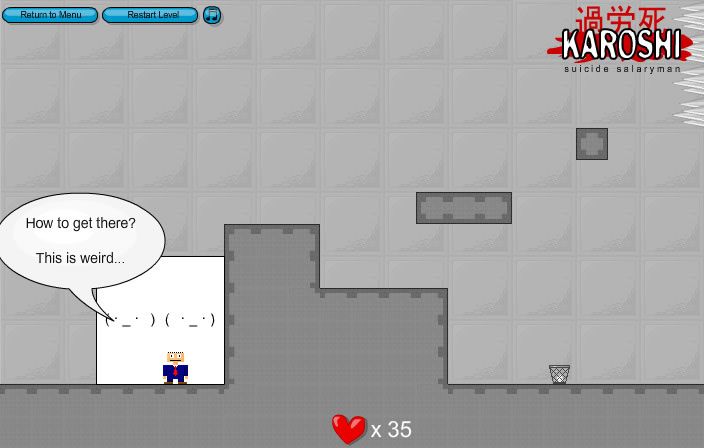
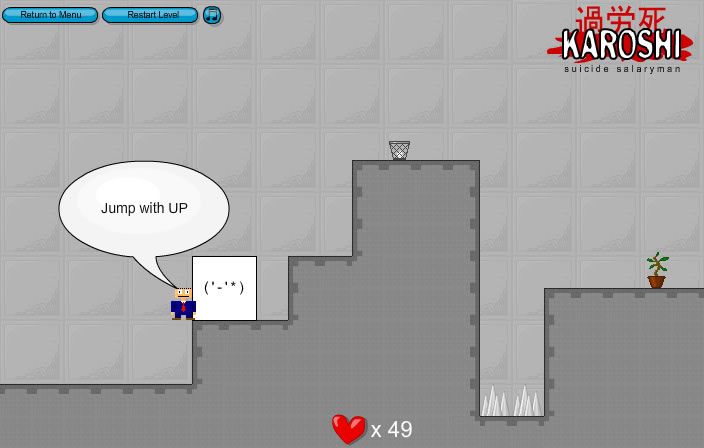
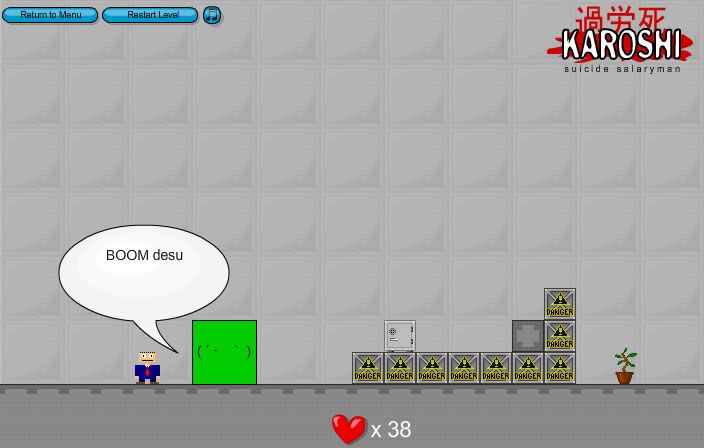
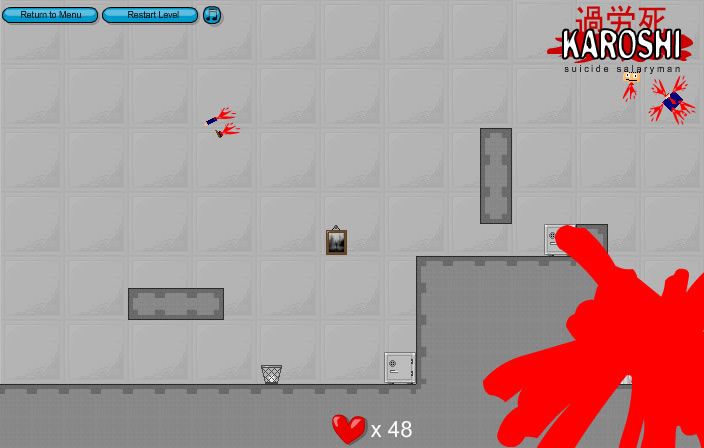
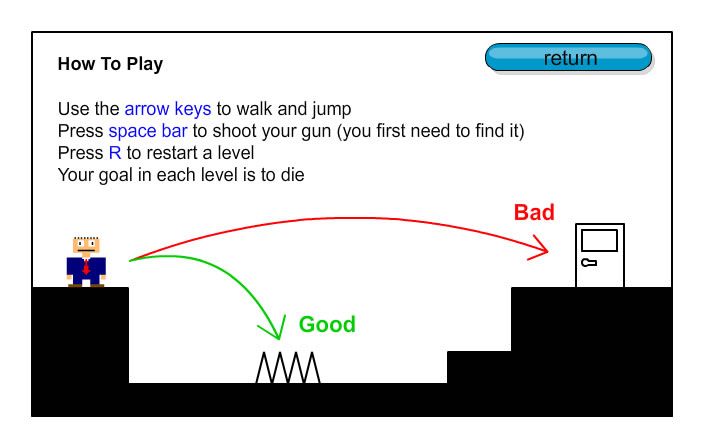
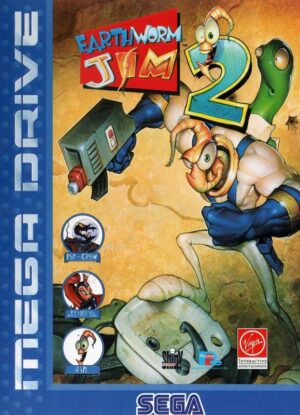


Reviews
There are no reviews yet.